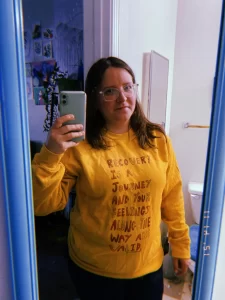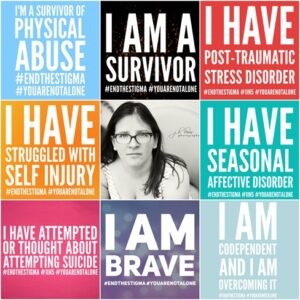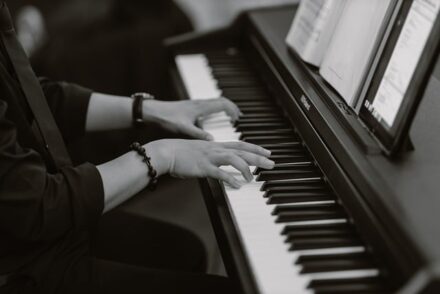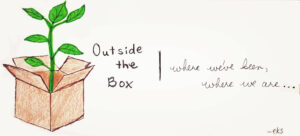Editorial Note: The following is reprinted with permission from Eleanor Skelton’s blog. It was originally published on March 26, 2022.  Content note: discussion of eating disorders
Content note: discussion of eating disorders
One year ago, I’d just started a new job, and the first paycheck wouldn’t come for a whole month.
I experienced food insecurity and unstable housing both in college and afterwards. The fear of not making it was so loud in my mind, and a little thought said: “Just don’t eat until you get paid.”
In that moment, I thought it made sense. As if I only deserve food if I do enough—if I work hard enough, if I earn enough money to justify allowing myself to eat.
I now realize this isn’t normal.
Last year, I was diagnosed with atypical anorexia or OSFED, which is just as serious as regular anorexia, but describes an eating disorder that is difficult to categorize according to diagnostic criteria.
Because I’m autistic, it’s hard to remember that I have a body that has needs, so I get busy with work or school and sometimes I honestly forget to eat. But other times it’s been intentional.
I hadn’t been eating enough food on a regular basis for nearly a decade. After a few weeks of trying to live on coffee and little else, I could barely climb stairs. Nerve pain shot down my neck into my arms while driving to work.
I realized if I didn’t stop, if I didn’t get help, it would eventually kill me.
Some of you have known me back when I was stuck in other self-sabotaging patterns like self-harm and unhealthy relationships. Eating disorders are quieter, harder to notice.
Almost nobody sees if you miss a meal.
Learning how to eat again wasn’t easy. It’s hard to find words for how difficult the first few months were—the stomach pain, bloating and falling asleep from exhaustion after meals because my body was struggling to process food.
My nutritionist, therapists and care team keep telling me that I deserve food even if nothing else is going right—even if I make mistakes. They tell me that my body still needs fuel consistently to do what I need.
Most of my friends know that I grew up in high-control communities (read: fundamentalist, Quiverfull, isolationist homeschooling) which left me feeling that I had no choice about what happened in my life and pushed me to wholly identify with a specific religious ideal—to be a living martyr.
And you had to hate your body. The more you hated yourself, your own flesh, the more spiritual you were.
Those born female were under intense pressure to be hypermodest, but also don’t commit the sin of gluttony. Enjoying anything too much—even food—was idolatry because what if you started to like it more than God. Dress like a 90s denim toned-down version of your pioneer farmer great-grandmother. Be just attractive enough to court and marry to repopulate the earth by birthing good little mini-Christians, but don’t be too pretty or someone else might sin just by noticing you.
I was told my flesh was a sin. They told me to “buffet my body” like the Apostle Paul. If only I could suffer enough, hurt enough, finally punish myself enough, maybe I’d become more perfect.
This was the sanctification I was taught. Starving myself seemed holy.
Now I know this is a deeply unhealthy form of Christianity, but this is what I experienced. All these years later, I’m still learning what Love should be.
I’m still learning that I don’t have to seek out painful experiences to become more perfect. I’m unlearning all the ways that I made myself feel less worthy.
And here, I have to give credit to several supportive friends and mentors who always gently remind me of my value. If not for all of you, I would not have survived.
Yes, my recovery comes from the determination I am finding to wake up every day and choose to eat… and live. But I am so grateful for those who remind me when I forget.
“Coming apart at the seams
And no one around me knows
Who I am, what I’m on
Who I’ve hurt and where they’ve gone
I know that I’ve done some wrong
But I’m trying to make it right…
I know that I love you
but I’m still learning to love myself.”
– “Still Learning,” Halsey
********
Shop at our Amazon store! As an Amazon Influencer, this website earns from qualifying purchases.



